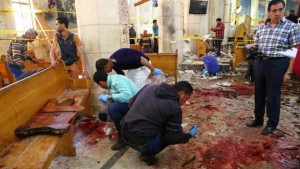Home » Commentary » Opinion » Moving against religious extremism
· Ideas@TheCentre
 Islamist attacks on Christian churches in Egypt last month finally prompted authorities to try and clamp down on religious extremism.
Islamist attacks on Christian churches in Egypt last month finally prompted authorities to try and clamp down on religious extremism.
Dozens of Coptic Christians, who make up about 10 per cent of Egypt’s 92 million people, have been killed in suicide attacks since December.
Now an Egyptian Muslim cleric and TV host, Salem Abdel Galil, has been barred from preaching for saying Jews and Christians follow corrupt religions and would not go to heaven.
“This is a slander of religion and threatens Egyptian unity,” said Coptic Christian lawyer, Naguib Gobrail. The Endowments Ministry, which controls Egypt’s mosques, is taking action against Galil.
The problem is that Galil’s pronouncements about the status of Christians and Jews living in a Muslim country is consistent with Islam’s uncompromising teaching about unbelievers.
Purity of existence is a central component of Islam. Believers are exhorted to engage in struggle or ‘holy war’ to defend the faith.
“Fight against those who do not believe in Allah nor in the Last Day, and do not make forbidden what Allah and His Messenger have made forbidden,” declares sura 9:29 in the Qu’ran.
A ‘pact of protection’ (ar dhimmi) provided the ancient basis for handling those who refused to convert to Islam. Today, dhimmitude defines the status of non-Muslims who live under Islamic rule.
“Islam is the religion of masters,” reported one Muslim convert to Christianity, “Christianity is the religion of slaves.” Little wonder that non-Muslim critics of Islam are met with anger and outrage.
The point where the sacred meets the profane lies at the heart of the religious worldview. In Islam, that meeting point is the text of the Qu’ran that was delivered, in perfect form, to the Prophet.
When teachings that sit uncomfortably with democratic ideals — and threaten civic unity — are derived from Islam’s sacred text, it is very difficult to call religious leaders to account for what they do.
At the very least, citizens of western, liberal societies must learn to take religion — and the claims of believers — seriously. Those who place their ultimate trust and hope in God do so already.
Moving against religious extremism